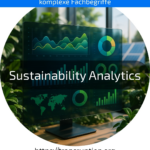The term "sustainability analytics" is particularly at home in the categories of big data and smart data as well as sustainability and environment 4.0. Companies use sustainability analytics to collect, analyse and evaluate data relating to environmental, social and corporate governance (also known as ESG). The aim is to make sustainable decisions based on facts and to better understand the impact of their own actions on the environment and society.
Sustainability analytics can be used, for example, to determine how high a company's energy consumption is, how much CO₂ is emitted during production or where resources can be saved. Many different data sources are combined and analysed.
A practical example: a manufacturer of beverages can use sustainability analytics to analyse exactly how much water and energy each factory requires and where waste occurs. This enables the company to recognise where improvements can be made to reduce environmental impact and save costs.
Sustainability Analytics therefore helps companies to operate more sustainably and fulfil legal requirements more easily - a real benefit for the environment, companies and customers.






